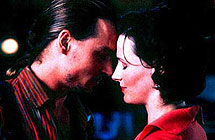|
|
|
|
Chocolat
|
 |
|
Lasse Hallström is the King of Middlebrow. From My Life as a Dog (1985) to The Cider House Rules (1999), he has worked out exactly what the least demanding arthouse patrons want, and shamelessly dishes it up to them. His films' production values have risen and become slicker in Hollywood, but the tricks and manipulations of his stories have only grown creakier. The formula of Chocolat, adapted from Joanne Harris' novel, is transparent. It is a food film edging towards magic realism, in the tradition of Like Water for Chocolate (1992). Vianne (Juliette Binoche) is a single mother and apparently a free spirit, arriving in the French village of Lansquenet with her small daughter, Anouk (Victoire Thivisol), and the intention to open a chocolate shop. This is a stuffy, disapproving community, steeped in tradition and held forever in check by a stern patriarch, Comte De Reynaud (Alfred Molina). Vianne's chocolates, naturally, contain fabulously life-enhancing and liberating properties. What's more, Vianne can tell, just by looking at someone, which specific bonbon they really need to jazz up their daily existence. Everything, predictably, proceeds from this Manichean dualism of fuddy-duddy elders and young-at-heart rebels. There are instant defectors to Vianne's camp, like the local children, the domestically abused Josephine (Lena Olin) and the cranky but compassionate Armande (Judi Dench). And there are slow-burners who we watch with anticipation, like the young priest Henri (Hugh O'Conor) or Josephine's brooding husband, Serge (Peter Stormare). Nothing matters in this film beyond the pretty photography, the enviable scenes of partying and dining and, of course, the chocolates. Johnny Depp has a virtually inconsequential role as Roux, a wandering jazz minstrel in a tribe of boat people. Every supposed dramatic or epiphanic turn in this film – from the repressed Comte's eventual brush with the devil's candy to the brief moment of violence that wells up within the village – elicits only groans from those unsympathetic to Hallström's typical audience-tweaking manoeuvres. Chocolat is certainly more accomplished than The Cider House Rules (which is not saying much), but it fails to put a decent, new spin on hackneyed conventions. This film should, on no account, be confused with Claire Denis' 1988 debut of the same name. In that movie, the title referred not to confectionary but skin colour, and a slang expression meaning "broken down". Come to think of it, that latter meaning makes Chocolat the perfect title to describe the state of Hallström's career. MORE Hallström: Once Around © Adrian Martin February 2001 |
![]()